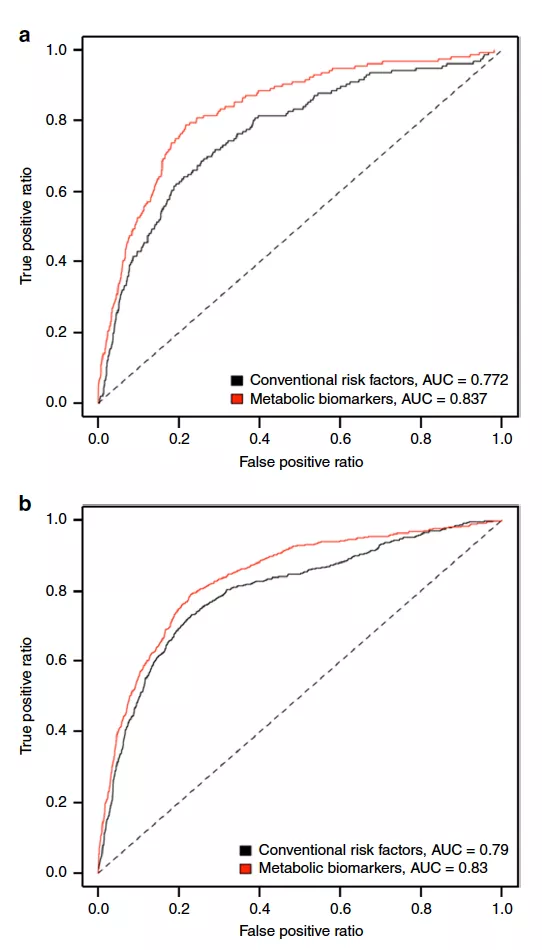|
|
|
|
|
血液生物标记物或有助于预测死亡风险 |《自然-通讯》 |
|
|
论文标题:A metabolic profile of all-cause mortality risk identified in an observational study of 44,168 individuals
期刊:Nature Communications
作者:Joris Deelen, Johannes Kettunen, Krista Fischer, Ashley van der Spek, Stella Trompet, Gabi Kastenmüller, Andy Boyd, Jonas Zierer, Erik B. van den Akker, Mika Ala-Korpela, Najaf Amin, Ayse Demirkan, Mohsen Ghanbari, Diana van Heemst, M. Arfan Ikram, Jan Bert van Klinken, Simon P. Mooijaart, Annette Peters, Veikko Salomaa, Naveed Sattar, Tim D. Spector, Henning Tiemeier, Aswin Verhoeven, Melanie Waldenberger, Peter Würtz, George Davey Smith, Andres Metspalu, Markus Perola, Cristina Menni, Johanna M. Geleijnse, Fotios Drenos, Marian Beekman, J. Wouter Jukema,Cornelia M. van Duijn & P. Eline Slagboom
发表时间:2019/08/20
数字识别码:10.1038/s41467-019-11311-9
微信链接:https://mp.weixin.qq.com/s/zO00COQ5pLwP53qbfrsNYw
《自然-通讯》发表的一篇论文A metabolic profile of all-cause mortality risk identified in an observational study of 44,168 individuals 报道了14种与全因死亡率相关的血液生物标记物。相较于目前已有的方法,这项最新发现或有助于提高5年及10年死亡风险的预测准确性。

图1:14种已鉴定的代谢生物标记物的死亡风险预测准确性 图源:Deelen等
有鉴于可用的临床数据量,预测病人最后一年的死亡率一般来说是可行的。过去的研究分析了血液代谢物特征和其他生理参数,以鉴定可用于预测死亡风险的生物标记物。但是,在预测更长期(5-10年)的死亡风险的问题上,研究人员未就预测指标达成一致意见。
德国马克思·普朗克老化生物学研究所的Joris Deelen及同事对来自12个队列、总计44,168名个体做了代谢组学分析,这些被试全部为欧洲血统,年龄在18岁到109岁之间。最后鉴定出了14种与全因死亡率相关的代谢物,已知这些生物标记物会参与各种过程,包括脂蛋白和脂肪酸代谢、糖酵解以及炎症。之后,作者利用鉴定出来的代谢物构建了一个用以预测5年及10年死亡风险的模型,该模型对于所有年龄段的预测准确性都高于基于传统风险因素的模型。
作者认为基于上述14种生物标记物和性别所得的风险分数可用于指导临床治疗,不过仍需要开展更进一步的研究。
摘要:Predicting longer-term mortality risk requires collection of clinical data, which is often cumbersome. Therefore, we use a well-standardized metabolomics platform to identify metabolic predictors of long-term mortality in the circulation of 44,168 individuals (age at baseline 18–109), of whom 5512 died during follow-up. We apply a stepwise (forward-backward) procedure based on meta-analysis results and identify 14 circulating biomarkers independently associating with all-cause mortality. Overall, these associations are similar in men and women and across different age strata. We subsequently show that the prediction accuracy of 5- and 10-year mortality based on a model containing the identified biomarkers and sex (C-statistic = 0.837 and 0.830, respectively) is better than that of a model containing conventional risk factors for mortality (C-statistic = 0.772 and 0.790, respectively). The use of the identified metabolic profile as a predictor of mortality or surrogate endpoint in clinical studies needs further investigation.
(来源:科学网)
特别声明:本文转载仅仅是出于传播信息的需要,并不意味着代表本网站观点或证实其内容的真实性;如其他媒体、网站或个人从本网站转载使用,须保留本网站注明的“来源”,并自负版权等法律责任;作者如果不希望被转载或者联系转载稿费等事宜,请与我们接洽。